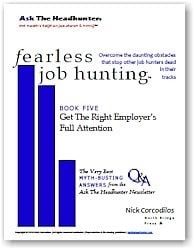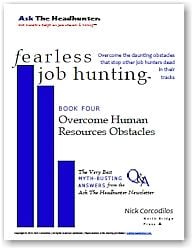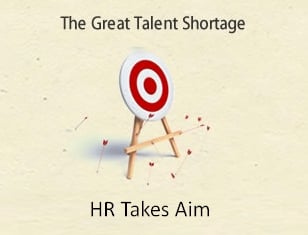In the June 5, 2012 Ask The Headhunter Newsletter, a guy gets honorably discharged from the military, carries a secret clearance, but has a misdemeanor conviction from 2003 for which he’s done probation. He gets a job offer. Then the nightmare begins:
Today I received a job offer from a large, well-known and respected company. I have a misdemeanor criminal conviction from 2003. I told the headhunter about the conviction. I put it in the application before my interview. I put it in the e-application for the background check. I even discussed it with the HR person that was giving me the offer.
 After discussing the conviction, she extended me a verbal offer. At the end of the call, I accepted the offer. She welcomed me to the team and said I will get all the details after the background check clears. After the phone call, I turned down a competing job offer from another company and told my headhunters that I am no longer on the job market.
After discussing the conviction, she extended me a verbal offer. At the end of the call, I accepted the offer. She welcomed me to the team and said I will get all the details after the background check clears. After the phone call, I turned down a competing job offer from another company and told my headhunters that I am no longer on the job market.
Less than an hour later, the HR person called me back and said she has to withdraw the offer because my three-year probation was cleared in 2006. Since that’s less than the company’s policy permits — seven years — I am ineligible for the job. The company’s security regulations would prevent me from gaining access to their campus.
The job posting required that the applicant must qualify for a government secret clearance. I was just honorably discharged from the military, where I held a secret clearance that I was able to renew after my misdemenor conviction.
It seems quite unethical to extend an offer prior to assuring that the information that I provided multiple times wasn’t an issue. This should have been caught well before I got the interview. Is this legal?
My Advice
This sounds like you got the shaft, but it’s a bit more complicated, based on the information you’ve provided.
I published your story in this week’s Ask The Headhunter e-mail newsletter, but I did not publish my advice and comments because I wanted to challenge our community to figure this one out. I asked subscribers to think about your story, and then come to the blog ready to post their take on it.
- Did HR give this job applicant the shaft?
- What went wrong?
- How could this situation have been handled better?
Here’s how I see it.
HR blew it.
While it was nice of the enthusiastic HR lady to give you the offer on the phone, she jumped the gun when she “welcomed you to the team.” You weren’t on the team yet, and she had no business implying you were. Someone needs to call her on the carpet.
The HR lady tipped you off.
The key to this entire unfortunate episode lies in this sentence: “She welcomed me to the team and said I will get all the details after the background check clears.” That meant she made you a contingent offer. It was not bona fide. That is, it was dependent on the background check. In other words, you had no offer to act on.
You jumped the gun.
I always tell job applicants who “get an offer,” to never, ever, ever resign their old job, or turn off other opportunities, until they’ve been on the new job for two weeks. Sounds kind of extreme, eh? Yah, well, so’s what happened to you. While odds are pretty good that a job offer will turn out fine, the enormity of the consequences if anything goes wrong is why no one should do what you did. [Correction: My bad on a poor turn of phrase that confuses two issues — when to turn off other job opportunities and when to resign your old job. Please see my comment about this below.]
Before even orally accepting the offer, you should have waited for a bona fide offer in writing, signed by an official of the company.
Before setting aside other opportunities (because there is no sure thing), you should have completed the company orientation, met your new boss, started the job, and ensured nothing goofy was going on at your new job. I’ve seen many people quit new jobs within the first two weeks. It takes that long to… well… make sure nothing’s goofy. You don’t want to be out on the street with nowhere to go if the new job goes south. (Likewise, an employer should not stop recruiting and interviewing just because a candidate accepts its offer.)
You did the right thing, again and again.
You disclosed, from the start and throughout the interview process, that you had a misdemeanor conviction. That takes guts, and it was the smart thing to do. The company had an obligation to be as candid with you, and to disclose its policy about hiring people convicted of crimes. It had no excuse for not detailing its policies once you made your disclosures.
 Do all employers behave like this? Absolutely not. It’s up to you to find the right employers and to know how to get their attention — because lousy employers aren’t worth your time or aggravation! Learn how to:
Do all employers behave like this? Absolutely not. It’s up to you to find the right employers and to know how to get their attention — because lousy employers aren’t worth your time or aggravation! Learn how to:
- Stop walking blind on the job hunt!
- Pick worthy companies.
- Test the company. Is it a Mickey Mouse operation?
- Recognize and beat age discrimination. (Or is it your own anxiety?)
- Deal with a bad reference. Don’t get torpedoed!
- Investigate privately-held companies — Here’s the secret!
- And more!
Don’t waste your time with the wrong employers! These methods are all in
Fearless Job Hunting, Book 5: Get The Right Employer’s Full Attention
But somebody didn’t do their job.
As soon as this employer learned about your conviction, HR should have pulled out its policy book and mapped it to your situation before making you an offer. The HR lady explained the policy clearly to you — too late!
What bunch of numbnuts knows it’s got a policy issue from the start, but ignores the implications of its policy? Especially because you were so candid and forthright about your problem, HR should have had the background check completed far sooner, and should have inquired about the dates of your conviction, sentence, and the resolution.
(I’m waiting for someone to suggest that, for legal reasons, the background check could not be done until you accepted the offer. That would be a good trick — accepting an offer for a job that company policy prohibits you from accepting.)
Who’s on the hook now?
I think the HR lady is on the hook. She should have made it crystal clear to you that the job offer was not yet bona fide, and that it was contingent on the background check. I think she should have even gone so far as to advise you not to take any other action until the check was confirmed. She blew it. She should be on the hook, but you’re the one who got hurt.
You’re on the hook because you rejected another (more bona fide?) job offer, and notified the headhunters that you’re no longer a candidate for a job.
Most important, this company’s HR practices are on the hook, and they need to be gutted and cleaned.
 There’s no way to beat HR, is there? Sure there is! Learn how to recognize and overcome these HR obstacles:
There’s no way to beat HR, is there? Sure there is! Learn how to recognize and overcome these HR obstacles:
- HR demands too much private information, like your salary history. But two can play this game!
- HR throws a “behavioral interview” at you.
- Online job application forms — learn to get past them.
- HR gets between you and the decision maker. Learn how to go straight to the hiring manager!
- The HR rejection letter: Why you should reject it!
- And more!
HR isn’t as tough as you think! You’ll find myth-busting answers in
Fearless Job Hunting, Book 4: Overcome Human Resources Obstacles
Doubling HR Costs: Time to change company practices.
Poor HR practices are what make HR executives scream that, “There’s a talent shortage!” Well, here’s the talent, fresh out of the military, worthy of a job offer, but… Aren’t an honorable discharge and a fresh secret clearance enough to merit more careful treatment when the company is looking at an applicant who qualifies for a secret clearance?
 Now where’s the talent shortage? In HR.
Now where’s the talent shortage? In HR.
HR spent a lot of company money to process this hire — only to stumble at the last minute. Now HR will spend the money again on another candidate. HR costs just doubled in this case. I wonder what the board of directors would have to say? Because HR will sweep the mistake under the rug, along with all the other good candidates HR lost because:
- An otherwise excellent applicant’s keywords “didn’t match;”
- A wise applicant didn’t want to disclose her salary history;
- A highly motivated applicant dared to contact the hiring manager directly;
- HR interviewed the engineering applicant but doesn’t understand engineering;
- The applicant seems a bit old;
- The applicant refused to meet with HR until he first interviewed with the hiring manager;
- And on and on… through the myriad wasteful practices we discuss on this forum that cost companies good hires every day…
It’s time for this company — and many companies — to take a good, hard look at HR practices because good talent is not easy to come by.
Whose bad?
That offer was no offer, so give it back! Has an employer ever given you a job offer, then rescinded it? Why? What was the reason? What did you do? What’s your take on this reader’s experience?
: :
 I believe in enjoying happiness and not worrying whether other people think you’ve been given enough of it. Who cares what others say about “one round of salary negotiations?” If you’re happy with the offer, accept it and thank the company.
I believe in enjoying happiness and not worrying whether other people think you’ve been given enough of it. Who cares what others say about “one round of salary negotiations?” If you’re happy with the offer, accept it and thank the company.






